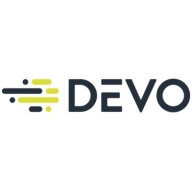

Splunk AppDynamics and Devo compete in the application performance management and data analytics space. Splunk AppDynamics seems to have the upper hand in real-time application performance management with its comprehensive metrics and transaction visibility.
Features: Splunk AppDynamics emphasizes application performance management with features such as transaction correlation, detailed metrics monitoring, and live end-to-end transaction visibility. It also offers auto-baselining for proactive troubleshooting and application flow maps. Devo stands out with its Activeboards for advanced visual data analytics and a multi-tenant architecture, allowing seamless management of data from multiple sources. Devo differentiates itself through ease of creating real-time rich dashboards and versatile data visualization capabilities.
Room for Improvement: Splunk AppDynamics could improve its integration capabilities with infrastructure and network monitoring, simplify agent deployment, and enhance end-user monitoring and documentation. Devo could advance its data parsing capabilities and integration with diverse data sources. Improvements in the customization of query outputs and reducing billing complexity associated with metadata ingestion would be beneficial.
Ease of Deployment and Customer Service: Splunk AppDynamics offers versatile deployment options across public, hybrid, and on-premises environments, though some users find the on-premises setup complex. Its customer service is generally praised but could improve in responsiveness. Devo offers easier deployments, especially in cloud environments, with professional support aiding setup and management, although some note a learning curve in onboarding.
Pricing and ROI: Splunk AppDynamics is often considered expensive, especially for small enterprises, due to detailed licensing models and high costs for additional features. It provides strong ROI by reducing downtime and improving performance, although the initial investment is challenging to justify. Devo's competitively priced capabilities face criticism over its metadata-based charging model. Its straightforward, ingestion-based pricing simplifies budgeting but requires careful understanding during procurement to avoid unexpected data enrichment costs.


Devo is the only cloud-native logging and security analytics platform that releases the full potential of all your data to empower bold, confident action when it matters most. Only the Devo platform delivers the powerful combination of real-time visibility, high-performance analytics, scalability, multitenancy, and low TCO crucial for monitoring and securing business operations as enterprises accelerate their shift to the cloud.
Splunk AppDynamics enhances application performance monitoring with advanced diagnostics and real-time insights, offering seamless end-to-end transaction tracking and infrastructure visibility.
AppDynamics provides critical tools for businesses to analyze application behavior and performance. Through innovative features like transaction snapshot analysis and adaptable dashboards, users can quickly identify and address issues, ensuring high levels of system uptime and efficiency. It is designed to support complex environments including Kubernetes and AWS, enhancing user experience by detecting performance issues early. Despite needing improvements in network monitoring and integration, it remains a robust option for tracking application health.
What are the key features of AppDynamics?In industries like financial services and e-commerce, AppDynamics facilitates performance tracking across distributed systems, optimizing infrastructure to meet consumer demands. It excels in environments needing precise transaction monitoring and is pivotal in delivering high value and satisfaction.
We monitor all IT Operations Analytics reviews to prevent fraudulent reviews and keep review quality high. We do not post reviews by company employees or direct competitors. We validate each review for authenticity via cross-reference with LinkedIn, and personal follow-up with the reviewer when necessary.